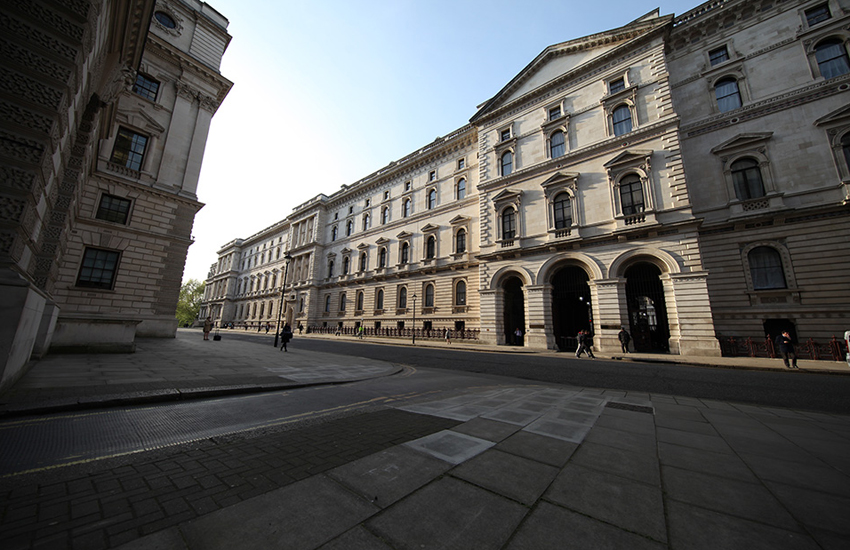To travel to LGBTI-unfriendly countries, or to boycott? To express your love on holiday, or to keep things discreet?
And what of countries where gay sex is illegal, but where it’s actually safer for LGBTIs than some where it’s legal?
Queer travelers share a sense of wanderlust, but also a sense of confusion. Travel for us is fraught with questions, potential hazards and conflicting advice.
In an effort to demystify the wealth of information out there, we stopped by the UK Foreign and Commonwealth Office in London’s Westminster to talk with Philippa Makepeace, Head of the Consular Assistance Department, to talk all things LGBTI travel. Here’s what we learned…
Hi Philippa. Do you ever worry about information out there being inaccurate?
That’s the case, isn’t it, when you’re trying to research. Is it accurate? Is it just reflecting one person’s experience? That’s why I suggest going to the FCO travel advice first. We focus carefully on making sure we’re giving factual advice. We don’t color it. It’s come from our embassies. The people who are writing it are living in that country, talking to the officials of that country.
That means when you’re looking at other sources, you can look critically. ‘Does that look like a site I should be trusting?’ Some of the blogs will say: ‘I had this dreadful time’. Then you’ll see the comments, 50 people saying: ‘Well, I went and it was absolutely fine!’
‘Everybody has different risk appetites’
For me, the whole point about traveling is you’re wanting to see the world. Everybody has different risk appetites. You can only make that choice yourself.
It is hard to keep up with changes in laws and customs abroad?
My team works really hard. Our travel advice changes daily. Every country is always doing something different. And we’re very clear on the website when information’s been updated.
Even though you updated the LGBTI advice page substantially last year – if people think ‘Oh, it’s a once a year thing’ – it’s more?
Yes, exactly. The LGBT page is general guidance. It’s probably less likely to change on a very regular basis. But anything that’s in a specific country, that can change very regularly.
Where do you get that information?
We’ve got a really massive network of embassies across the globe. They’ll have their own contacts in the countries where they are. It’s fascinating.
What would happen if an LGBTI person was arrested in a foreign country because of their sexuality, or for having sex? What would the process be?
First of all, it will depend on the country. Each country has its own judicial process. Its own way the police force works, rules and regulations.
In terms of support from the Foreign Office, what you can expect as a British national is once you’re arrested, regardless of which country you’re in, they should ask whether you want them to contact your embassy on your behalf. If they don’t ask, you have every right to say: ‘I want you to tell my embassy that I’m here. I want to talk to them.’
‘We have 2,000 British nationals in prison overseas at any one time’
As soon as we know we have a British national who’s in detention, we will get in touch as soon as possible.
We have things called ‘prisoner packs’. Which is effectively giving a sense of that country’s judicial system; what might happen next to you, giving people a bit of understanding.
Because quite often, very often, when people are arrested overseas – we have 2,000 British nationals in prison overseas at any one time, about 400 in the US – so we have a number of British nationals who are in detention.
‘The thing we can’t do is get people out of jail’
So we’ll want to understand what the issue is and what support we are able to provide. Now, the sorts of support we’re able to provide is to make sure people’s welfare is assured. If people are being treated differently from other prisoners because they’re British, we can raise that and make sure that doesn’t happen, or try.
We can provide lists of local lawyers people may want to use to further their case. And we can generally keep contact, and put people in contact with a great charity called Prisoners Abroad.

The FCO in London
The thing we can’t do, and I think often people expect we might be able to because we’re the British government, is get people out of jail. So even if you have been jailed because you have done something illegal in the country you’re in, but it is perfectly legal in the UK – something like gay sex – that doesn’t mean we are able to get you out of prison.
If there are 2,000 British nationals in prison overseas at any given time, how often is it because someone’s arrested because of their sexuality?
That’s a difficult one to answer. I don’t have the data in front of me. So, the 2,000 people, some of them could be people in for the night. Drunk and disorderly, out the next day. So it’s a really changing number. And I’m not sure that the database that we use, that we can interrogate the data on the charges.
Part of the reason for that is we are very non-judgemental in our support. It doesn’t matter what you’ve been accused of doing or what you’ve been sentenced for having done. We will provide exactly the same support to you. It’s almost slightly irrelevant to our case management.
Is there any specific advice you can give to same-sex parent families?
I would say families and parents have the same sort of issues, regardless of whether they’re a same-sex parent or a straight parent. Because quite often, when you’re traveling, you’re thinking of your child and their needs.
Aside from that, it’s inevitable that same-sex parents will be looking at ‘How is our family going to be treated? Are we going to be welcome there? Are we going to feel comfortable, are we going to be happy there?’ So, it’s the same advice. Do your research. Look into it.
‘Again, that idea of bigger cities, certain hotel complexes, you’re far more free’
Looking at a specific example, what would your advice be to a same-sex parent family considering visiting Dubai?
Dubai’s a good example. It’s illegal to be homosexual there, and there are quite severe penalties if you’re in that position. But actually, in general, it’s a fairly tolerant society. Surprisingly so, when you see the laws perhaps.
We would very clearly be saying, really understand what the rules are. Understand what the differences are in different parts. Again, that idea of bigger cities, certain hotel complexes, you’re far more free.
That’s the same for lots of laws in that country. You may have more leeway if you’re in a five star hotel or whatever, than if you do something more local.
If a couple with kids were arrested on holiday, what would happen to them?
Again it would massively depend on the country. But in general, the parents who are detained would keep their responsibility for the children. What that means in practise is that if there is a trusted friend or relative nearby, or able to come, then that child would get moved into their care.
If that’s not possible, then the children will go into the care system in the country they were seized. That’s the same for any parent. The FCO will never take on that child’s custody. It’s not what we’re trained for. But the FCO will and does keep a very strong view on child safeguarding. Making sure children are being treated properly, regardless of where they are. I have a team, my child protection team, who deal with individual child welfare cases.
Specifically thinking about trans travelers, what would your advice be?
We try to make sure the advice we’re giving is giving a close and in-depth look at the local laws and customs as we can. That’s really so the whole spectrum of people’s sexualities and gender identities are – people can look into the information and take what they need out of it, rather than trying to be very specific about it.
But we do know in certain cases, particularly passport identity, there can be particular issues. So we signpost on our travel advice to the passport office. They have specific guidance about your passport and what you might want to do to make sure you have fewer troubles as you’re going through other countries’ border controls.
It talks about, when you’re applying for a passport, if you want to change your assigned gender, if you want to update it, what sort of information do you need? It’s a really simple, blow-by-blow, this is what you need if you’re going to apply for a passport. It’s actually incredibly accessible.
Do you see the situation getting easier for trans travelers at border controls?
Every country’s different. Actually, the border controls of different nations, regardless of whether you’re trans, can be quite taxing sometimes.
I think it’s quite clear over the last couple of years, trans issues have become far more – I don’t want to say far more mainstream, but they’re talked about more, they’re understood more. That can only help. There’s much more conversation about it in the media. At least it is here. I guess the issue is, it may well not be in other countries.
‘What is the actual law? What is the thing that are illegal in that country, and not?’
In terms of advice [for trans travelers], the example I think of is Brazil, where gay and lesbian people are welcome but trans people aren’t as much – or at all.
I think that’s a very fair thing to say. You also have differences between lesbian or gay relationships and how they’re seen. Whether they’re socially accepted or not socially accepted. So we’ll always be as clear as we can: ‘What is the actual law? What is the thing that is illegal in that country, and not?’
And we’ll try to give a sense of whether the social attitudes fit that. Because in some countries it may be illegal, but the social attitudes are quite open. In others, it may be legal but actually, social attitudes are incredibly conservative.
How do you feel about press coverage raising the profile of a case?
It’s case-dependent. My experience of media coverage, because it’s quite a blunt tool, is it’s not always clear what the impact will be. We always talk to families when they’re talking to us about the case. We’ll always talk to them about media. If it’s something they want, and of course it’s always down to the family and the individual, whether they want to publicize their case.
‘Media coverage – it’s quite a blunt tool’
We will advise on what we think is best. But it’s absolutely up to them to make those choices. I’d say in some cases it might be able to move things along. In others, it may well stall issues, because people don’t like to see the publicity. I don’t mean that in the UK, but in whichever country they’re in. It’s not always easy to judge how UK media will impact international authorities. Sometimes it has no impact. Sometimes it has a good impact. Other times it will have terrible impact.
It’s not always easy to control. It’s almost impossible for families to keep control of the messages they’re wanting to get out there. That can cause problems. If they see that that media is having a negative impact on their loved one, they can’t always then stop it.
I’m sure there are LGBTI people in prison right now. What can we do to support those individuals?
A very practical way of supporting would be to get in touch with Prisoners Abroad actually. They’re a small charity, but they do amazing work.
For more information head to the Foreign & Commonwealth Office, or its dedicated page on travel advice for LGBT travelers







